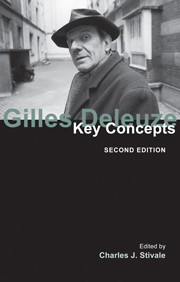Book contents
- Frontmatter
- Contents
- Contributors
- Acknowledgements
- Abbreviations
- Introduction: Gilles Deleuze, a life in friendship
- PART I PHILOSOPHIES
- PART II ENCOUNTERS
- 5 Sense, series
- 6 Event
- 7 Assemblage
- 8 Micropolitics
- 9 Becoming-woman
- 10 The minor
- 11 Style, stutter
- 12 The logic of sensation
- 13 Cinema
- Part III FOLDS
- Chronology
- Bibliography
- Index
9 - Becoming-woman
from PART II - ENCOUNTERS
- Frontmatter
- Contents
- Contributors
- Acknowledgements
- Abbreviations
- Introduction: Gilles Deleuze, a life in friendship
- PART I PHILOSOPHIES
- PART II ENCOUNTERS
- 5 Sense, series
- 6 Event
- 7 Assemblage
- 8 Micropolitics
- 9 Becoming-woman
- 10 The minor
- 11 Style, stutter
- 12 The logic of sensation
- 13 Cinema
- Part III FOLDS
- Chronology
- Bibliography
- Index
Summary
The concept of becoming-woman is both intriguing and controversial. While becoming-woman exemplifies the radical contribution and creativity of Deleuze's (and Guattari's) thought, it has provoked harsh criticism, particularly from feminist scholars. I preface my discussion of becoming-woman with a brief introduction to the concept of becoming. Then I address becoming-woman in two contexts, both described in A Thousand Plateaus: becoming-woman in the context of feminism and becoming-woman in the context of the girl.
Becoming
With the concept of becoming, Deleuze counters our fascination with being and power. Being is about those questions that have engaged philosophers, scientists and theologians alike for centuries: what is the essence of life? What makes us human? What does it mean to exist, biologically, culturally, historically, spiritually? Our fascination with power engages us in questions of control, possession and order: how is life, organic and inorganic, but especially human life, ordered, classified, distributed and managed? How can we control what happens, shape our possibilities, counter forces that hinder us from realizing our needs, ambitions and dreams?
For Deleuze, such questions fail to engage the constant unfolding of what is becoming and the vitalities, energies and potentialities of a life.
- Type
- Chapter
- Information
- Gilles DeleuzeKey Concepts, pp. 116 - 130Publisher: Acumen PublishingPrint publication year: 2011

